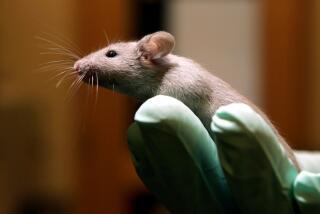Menacing Pressures in Medical Research Seen
- Share via
WASHINGTON — New pressures for funding, fame and profit have created an atmosphere that is sometimes conducive to scientific misconduct, the chairman of an Institute of Medicine study committee reported Monday.
Dr. Arthur H. Rubenstein of the University of Chicago said the field of biomedical research has seen “increased stresses” from competition for decreased funding. And he said the race to develop new drugs makes research irregularities more likely than a decade ago.
The Institute of Medicine report also said research institutions need tighter standards and systematic ways of investigating laboratory irresponsibility.
“Although the committee believes that serious misconduct in science is rare . . . it concludes that institutions fail to detect and correct early deviant behavior primarily because of an excessively permissive research environment that tolerates careless practices,” the committee report said.
Funding pressures and an overemphasis on publication of research in scientific journals also encourage what the committee called “substandard practices.”
Lack of Guidelines Noted
The Institute of Medicine, chartered by the National Academy of Sciences, organized the 17-member committee in 1987 after a series of fraudulent and careless laboratory reports had come to light.
Few institutions, the report said, have explicit research guidelines and this allows the system “to tolerate substandard activities by a small number of individual investigators who fail to observe generally accepted practices.”
To correct the problems, the committee made 16 recommendations. These included:
- That by 1992 all institutions conducting medical research for the National Institutes of Health be required to adopt specific policies to promote ethical research practices and to investigate misconduct.
- That the NIH limit the number of publications considered in a grant application so that evaluations of a researcher’s past work are based on quality, not quantity.
- Academic departments should adopt new authorship policies that will not emphasize quantity.
- That scientific journals develop policies “to promote responsible authorship practices,” including a system to respond to charges of misconduct.
- That researchers receive training by institutions and professional organizations in proper standards of scientific research.
More to Read
Sign up for Essential California
The most important California stories and recommendations in your inbox every morning.
You may occasionally receive promotional content from the Los Angeles Times.













